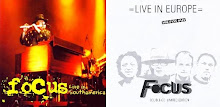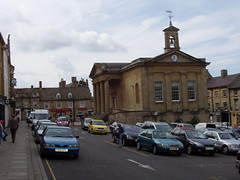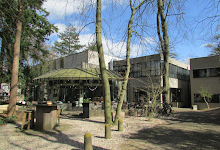Focus have used a limited number of recording studios over the years.
The
first two studio albums were recorded mostly at Sound Techniques
(Moving Waves partly at Morgan Studios) and the third and fourth at
Olympic B, both in London.
The core tracks that appear on the album Ship of Memories were recorded at Mike Vernon's studio in Chipping Norton. For Mother Focus
the band recorded in Los Angeles. Since that time studio recordings
have been made in Holland and Belgium at EMI Hilversum, Studio
Spitsbergen in Zuidbroek, Peptide Studio in Vuren and for the last two
albums at Fieldwork Studios at Schoten in Belgium.
Olympic Studios was a renowned independent commercial recording studio located at 117 Church Road, Barnes, South West London. The studio is best known for the huge number of famous rock and pop recordings made there from the late 1960s onward.
The building which housed the studio was constructed in 1906 as a
theatre for the Barnes Repertory Company, and later became a cinema.
Guild TV purchased the building in the late 1950s and converted it into a
film studio. In 1965 it was purchased by Olympic Sound Studios. The
conversion from film to recording studio was undertaken by architect
Robertson Grant and the acoustics were completed by Keith Grant and
Russel Pettinger.
Olympic's sound mixing desks were a creation of the maintenance staff
and built specially for the studios. They became famous as Olympic desks and were developed by Dick Swettenham, Keith Grant and later, Jim McBride in conjunction with Jim Dowler.
Swettenham later started to manufacture the consoles commercially as
Helios desks.
Amongst other accolades, the studios won Music Week Magazine Best Recording Studio,
five times. However, after 40 years of renowned recording history
and a succession of owners, the studio facilities were closed down by
the merged EMI and Virign group
in 2009.
The original Olympic Sound Studios was established in central London in the late 1950s and was owned by Angus McKenzie who had bought Larry Lyons Olympia Studio in Fulham. McKenzie then took a lease on a derelict synagogue in London's West End.
In conjunction with Swettenham, McKenzie opened Olympic's Studio One with the tube desk from Olympia. Grant joined the company in 1958 as music engineer. Swettenham designed the first professional transsistorised desk in the world, which was installed into Studio One during 1960, along with the first four track recorder in England.
When the lease expired in 1965, the studio was bought from McKenzie by Cliff Adams and Keith Grant and they moved it to Barnes, a year later. Among artists who worked at the studio were the Rolling Stones, the Beatles, Jimi Hendrix, the Who, Traffic and Led Zeppelin. Procul Harum recorded Whiter Shade of Pale there.
Over the 1970s, Grant commissioned his father Robertson Grant to re-design Studio Two,
as the now working and successful studio was causing problems with
sound transmission to Studio One. Robertson Grant successfully innovated a completely floating space
weighing seventeen tonnes, which was supported by rubber pads.
At this time Mick Jagger
became involved with the charge of decor and furnishing and produced a
contemporary design. Later, Grant added probably the first Instant acoustic change
using rough sawn wooden slats, to cover or reveal absorptive panel
behind, thus changing the acoustics. This made the room suitable for the
recording of both rock and orchestral music, at the pull of a cord.
In 1987, Virgin Music bought the studios. Barbara Jefferies, then Studio manager for virgin at Olympic Studios, instructed that the master tapes of the studio's vast, historic library of recording sessions be discarded. The disposal of these tapes was unsecured as they were put into skips
outside the building, and left for days; they were subsequently
pillaged by hordes of freeloaders, and some are thought to have been
sold for large sums of money as bootlegs.























2 comments:
southwes recording studio has created this website as a
virtual tour of the studio. Our goal is to provide you with
answers to all the questions you would ask if you were here.
We hope you will find everything you need to plan and book
your project with us.
recording studio southwest
somerset recording studio.co.uk
wow! what a knowledgeable blog. Thanks for sharing a great blog and very helpful for me!
Post a Comment